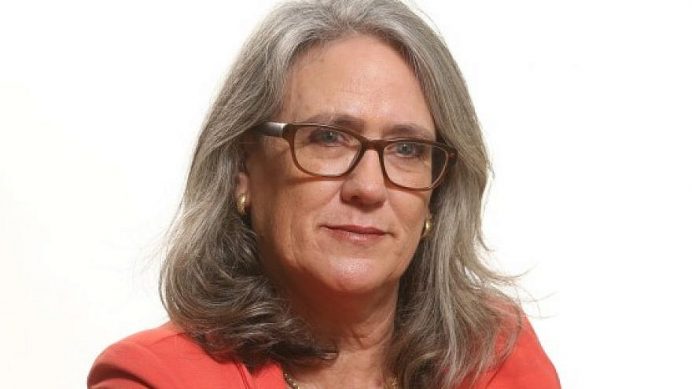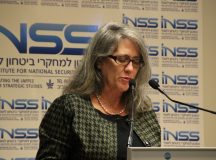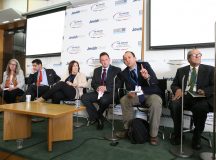Azriel Bermant pays tribute to Fathom advisory editor Emily Landau who died 6 January 2020.
It was with deep sadness and a profound sense of loss that I heard of the passing of Emily. It had been a privilege for me to work with Emily at the Institute for National Security Studies between 2012 and 2015. Her intellectual dynamism and passionate convictions shone through in everything she did, whether it was in her writing on Iran’s nuclear programme or in the various arms control forums that she hosted at INSS. For so many Israelis, discussion on the topic of arms control and nuclear proliferation is limited largely to regional threats: in particular, the nuclear threat from Iran. Emily tried to create greater awareness of the global problems relating to nuclear proliferation. Her expertise and scholarship went well beyond the issue of Iran. She wrote prolifically on a range of other issues, including North Korea’s nuclear programme, US-Russian arms control and the efforts to achieve a zone free of weapons of mass destruction in the Middle East.
Of course, Emily was best known in Israel and beyond for her work on Iran’s nuclear programme. She was viewed by many as a hawk on this issue. Arguably, what upset her most about the Iran nuclear deal, also known as the Joint Comprehensive Plan of Action (JCPOA) was that Iran was never forced to come clean about its nuclear activities. She believed that the Obama administration had squandered its leverage in the process. In the last INSS Insight piece that she wrote on Iran (November 25, 2019), she countered the idea that the Trump administration’s maximum pressure campaign had encouraged Iran to violate the deal. Since the JCPOA had substantial flaws, she argued – in particular, the unconditional sunset clauses – Iran would have breached the deal at some point. From this perspective, there was an argument that it would be better to address Iran’s violations now when it is weak, than waiting 5-10 years later when it is in a much stronger position. She believed that a coordinated international campaign of pressure against Iran was the only way to bring about a change in its behaviour.
Emily was interviewed regularly in the media on Iran’s nuclear programme. In 2015, she participated on the BBC ‘Intelligence Squared’ debate when she argued for the motion that ‘the nuclear deal with Iran Won’t Make the World A Safer Place.’ She was joined by Alan Dershowitz and faced off against Jack Straw, a former foreign secretary in the Blair government and Lord Lamont who served as John Major’s Chancellor of the Exchequer. Emily argued that the nuclear deal had undermined the global nuclear non-proliferation regime in granting Iran the right to nuclear enrichment, in spite of its cheating. Saudi Arabia, for example, would now also seek the same nuclear rights as those that Iran had obtained under the deal.
Emily’s clarity of thought and cogent argumentation on this issue, as on so many other topics, was perfectly illustrated in her response to the controversial Kenneth Waltz article, ‘Why Iran Should Get the Bomb: Nuclear Balancing Would Mean Stability’ (Foreign Affairs 91:4, July/August 2012). Waltz argued that it was only natural that Iran should seek a nuclear capability to restore a balance of military power in the region. Iran’s development of nuclear weapons was a legitimate response to Israel’s nuclear monopoly. Israel and Iran would deter each other so stability would be enhanced by Tehran’s possession of the bomb. This was anathema to Emily. She countered Waltz by pointing out (‘When Neorealism Meets the Middle East’, Strategic Assessment, 15:3, October 2012) that reductive neo-realist theory was ill-equipped to analyse real-world situations such as nuclear proliferation in the Middle East. Neo-realism had presented the concept of security (or survival) as the key determinant of state behaviour. Thus, Waltz maintained that Iran’s pursuit of a nuclear capability was based on its basic need for security. Emily countered that Hans Morgenthau’s classical realism with its concept of power as the key factor driving state behaviour was better able to explain Iran’s pursuit of a nuclear capability. Iran was seeking a nuclear capability as a shield to bolster its hegemonic ambitions in the Middle East. There was no basis for assuming that Iran’s motivation was defensive in nature. Furthermore, rather than viewing Israel’s assumed nuclear capability as a threat and a source of instability, Arab countries such as Saudi Arabia were more worried about Iran than they were about Israel. Seven years on, this argument appears prescient and certainly more convincing now than it did in 2012.
Emily was a popular speaker at the annual AIPAC policy conference, but she was also a sought-after participant at leading global strategic forums such as Wilton Park and Track II events relating to arms control and regional security. The arms control conferences that she directed at INSS attracted leading experts from around the world. I was impressed by Emily’s interest and openness in showcasing scholars reflecting the large diversity of views in the field, including nuclear disarmament activists who did not necessarily share her positions on arms control issues.
Emily invested in the nurturing and development of a great team that worked closely together. She also excelled as a mentor. Unquestionably, this was an important part of her legacy. Those of us who worked under Emily can also attest to her fun side and sense of humour that often came to the fore during departmental meetings. Her professionalism and clear-sightedness meant that it was always a pleasure to write with her. Ephraim Asculai who worked with Emily for well over a decade believed that her wide-ranging knowledge, her very clear perceptions, her personal experiences and large professional group of cohorts provided a font of knowledge which always responded to the many problems that were always cropping up. He recalls the conversations held over the phone that helped to clarify contentious issues which ensured that the writing always went smoothly. In retrospect, he is astonished that they never had heated discussions during the writing process.
Emily was also very supportive of Fathom from the outset, and was an advisory editor for the journal. On one occasion, when clearly under the weather, she embarked on a speaking engagement for Fathom. Her voice was hoarse, her eyes were bloodshot and she was doped up on medicine, but she would not be held back. Emily was also a dedicated teacher, and lectured on nuclear strategy, negotiations and arms control in the executive MA programme on Diplomacy and Security at Tel Aviv University, as well as in the Lauder school of Government at IDC Herzliya and the International School at the University of Haifa. In spite of Emily’s frenetic work schedule, family was no less important, as I discovered when she insisted on taking phone calls from her children in the course of meetings.
The great tragedy is that Emily had so much more to give. Whether we look at Iran, North Korea, the collapse of US-Russia arms control or China’s nuclear modernisation, it is no exaggeration to say that the dangers arising from the use of nuclear weapons has never been greater. How we will miss her clear-eyed views on these issues. She is and will be sorely missed.




































